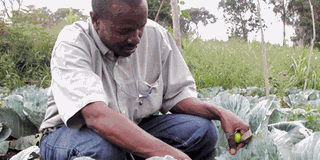Confronting neoliberal business culture in Uganda

Policies in neoliberal markets fail to address the real challenges of the common man in the market.
In the debate about improving the livelihoods of rural communities in Uganda, the technocratic, political and economic elites, both domestic and foreign, urge the ‘commercialisation of the peasants’.
They say that people need to produce more, and of better quality, to be more entrepreneurial and that they need better access to markets.
While markets loom large in the neoliberal dogma of those who do the urging, the market they are thinking of is an abstract ideal.
Donors, NGOs and government officials rarely talk about the realities of the market arena in present-day Uganda.
Our research into rural markets in eastern Uganda reveals that malpractice was often a significant element of these markets.
Extensive interviews in Kampala and in the districts of Mbale, Bududa, Manafwa and Sironko suggest that face-to-face rural trade practices have been characterised by higher levels of malpractice and a change in their form since the onset of the largely externally imposed economic reforms (liberalisation, deregulation and privatisation) of the late 1980s and 1990s.
According to many of our interview partners and their accounts of economic life since liberalisation, a section of the traders (including middlemen and brokers) who bought agricultural produce from smallholder farmers in greater Bugisu engaged in deception, intimidation, theft (actual theft or non-payment for produce taken on credit), collusion (price cartel like) and corruption (to get protection and other forms of special treatment), and there was widespread use of weighted scales to trick farmers.
A good number of traders in these areas were said to operate on behalf of firms that were owned by national or foreign elites.
Malpractice was also a problem in other sections of the private sector in Uganda, for instance in parts of the industries that were in business concerning agricultural inputs (‘fake seeds’), construction, logistics or health.
In the decades before the neoliberal reforms, there was malpractice in the rural economy.
However, this were largely kept in check, especially in the 1960s, by state regulations, by common values and norms and the related sanctions, and by the quality control of the cooperatives that were a central part of commercial agriculture.
These cooperatives were weakened by years of political and economic conflicts and the actions of some of their leaders, and were finally dismantled as part of the economic reforms.
Many farmers we interviewed in greater Bugisu estimated that the majority of traders - for example, at least seven out of ten - were involved in malpractice.
The interviewed traders generally acknowledged that malpractice was carried out by a number of them. Interestingly - and perhaps reflecting their idealised view of the market and their position in the political economy of the country - most of the higher-ranking government officials, NGOs and donors we interviewed put the figure at between two and three out of ten.
Partly in response to traders’ malpractice, and partly for reasons of poverty and opportunity, some farmers also engaged in deceptive practices.
Their malpractice was, however, less frequent and of restricted intensity and scope (mostly produce adulteration and pre-finance misuse).
Practices of the small traders, who at times were farmers themselves, were often also affected by poverty-related concerns and the difficult economic situation, for example various uncertainties and financial pressures.
And some traders have, in fact, found themselves being tricked by some of the larger (export) companies they were transacting with; for example, the quality of produce was questioned so as not to pay the quality premium, or quality measuring and pricing was done in a hidden fashion.
Some traders also, at times, tricked these companies. Our research thus identified cases of chains of malpractice in the parts of the Ugandan agro-economy that we studied, but also, as our past research showed, in parts of the global economy more generally.
A huge problem in this context is the power imbalance in rural markets: the interviewed smallholder farmers mostly experienced a decline in their bargaining power as a result of the liberal reforms. They often had to accept the traders’ malpractice because they had hardly any alternatives and needed cash to deal with the most immediate, often family-related problems (a situation which was similar for some small traders vis-à-vis the malpractice of a large buyer).
When farmers approached state officials to complain, they were often told that the government can’t intervene because the economy had been liberalised, and that they would simply have to get used to a changed business environment.
Many people (both farmers and traders) narrated that when they carried out malpractice they adjusted, switched off or (temporarily) dropped some of their moral beliefs and commitments due to the severe economic difficulties they were facing and acted in ways that they (and others) actually regarded as improper. Often, it pained them that they had to do it.
In other words, in neoliberal Uganda, many of our interview partners could no longer afford to (always) practice their morals.
And they emphasised that this was now a more general problem in the country which affected many fellow Ugandans.
Overall, a lot of the farmers we spoke to found themselves operating in a tough rural context with often substantial levels of deception and corruption in their market dealings and among a range of non-state and state bodies.
Continued in our next week’s edition.
Jörg Wiegratz is a PhD researcher at the University of Sheffield, Department of Politics.




